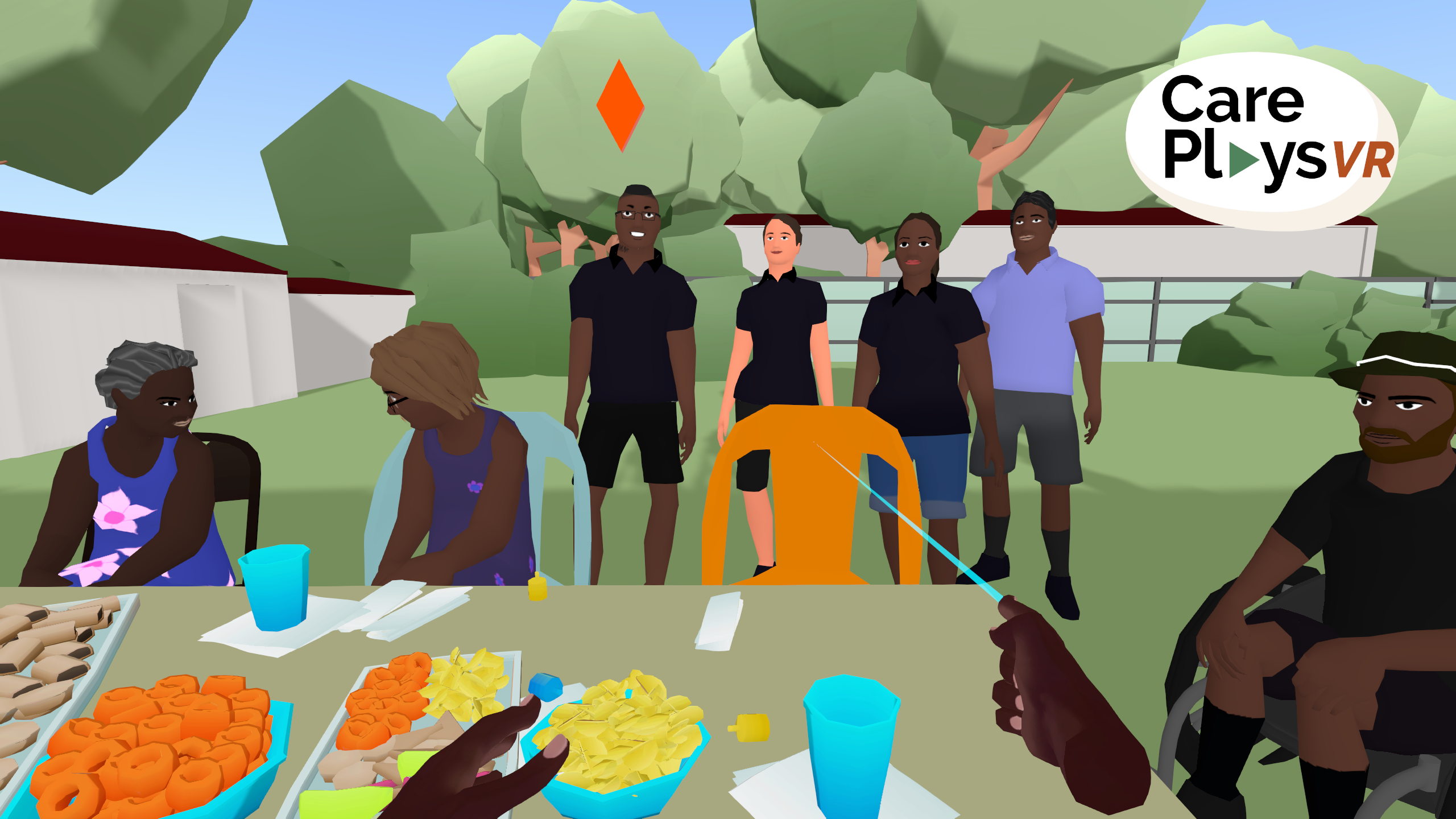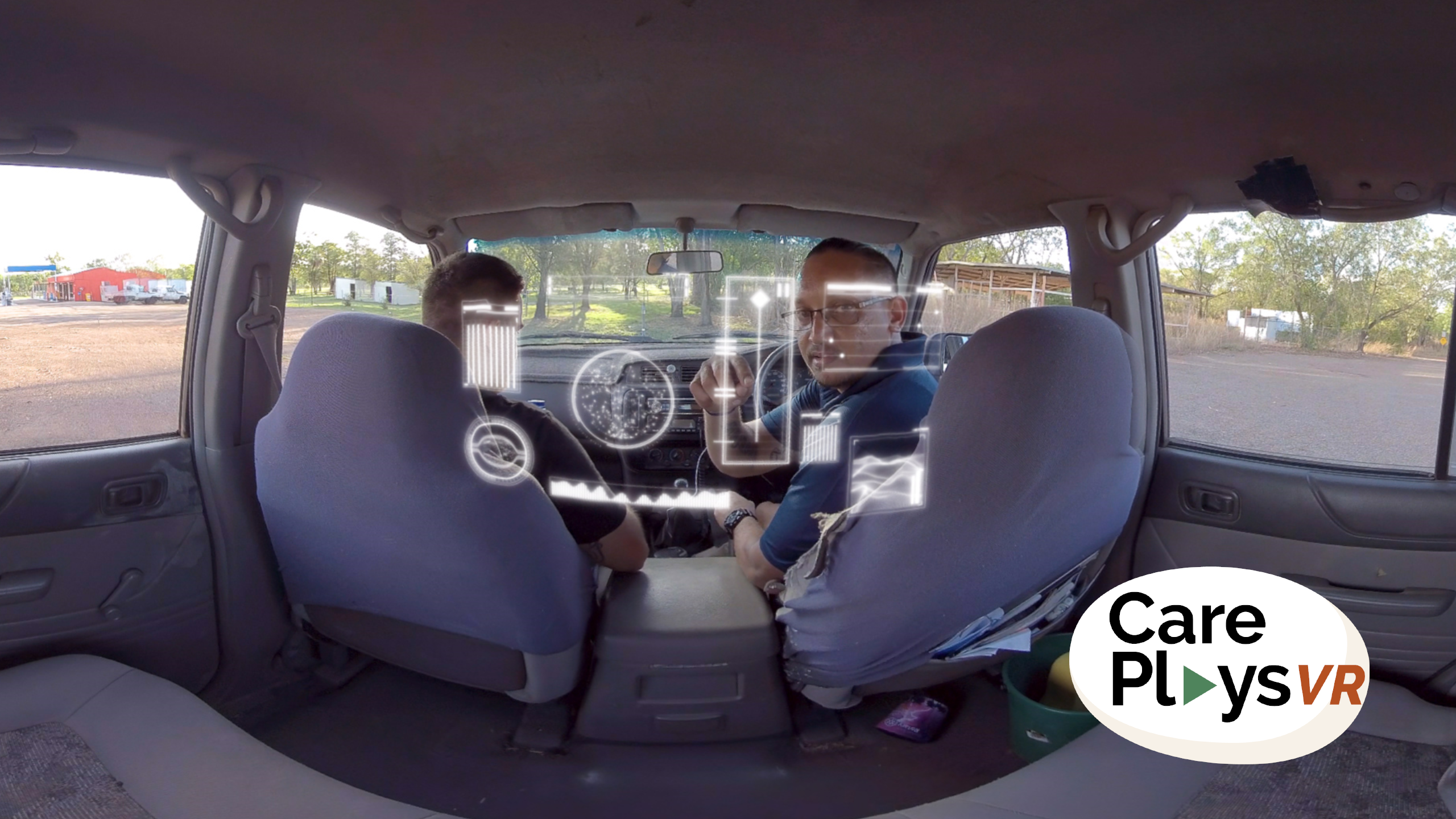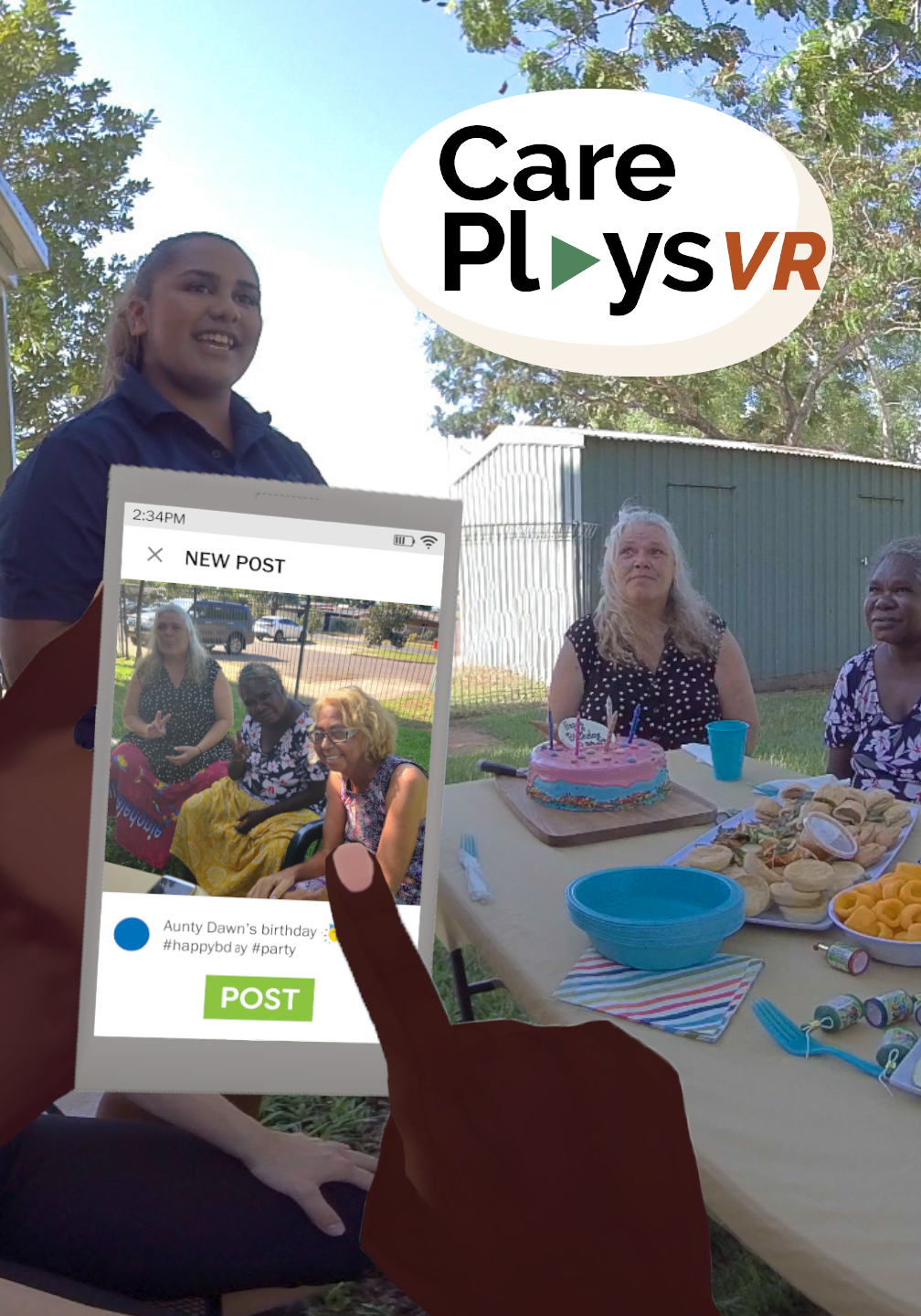
More about Care Plays VR

What the Care Plays VR project was trying to achieve?
The goal of Care Plays VR is to increase the number of Indigenous young people, employed in the growing aged care and disability services sectors.
Care Plays VR: innovation that worked!
Through a Virtual Reality (VR) immersive multimedia game, young people from Indigenous communities in Alice Springs, Darwin and Tennant Creek in the NT were introduced to care sector work. Care Plays VR is culturally appropriate, having been co-designed with indigenous young people, with local indigenous talent involved in written, directing, and acting in typical scenarios of work in care sector roles.
The young people were referred by schools, youth programs, job actives, Transition to Work providers, the Community Development Program and through word of mouth. After playing the VR game, they undertook a 4 week training program and 2 weeks of work experience, before being placed into jobs in the care sector.
Participant training was based on the Get SET–Skills, Employment, Training Program (ISACNT product). This comprised a suite of resources specifically tailored for entry-level care and support sector work in the Northern Territory. Training prepared participants to enter the sector workforce as a support worker. It also provided an understanding of the skills that would help young people embark on a career within the sector. Participants received the support they needed to address other issues that may have been barriers to future employment, including with transport, licenses, housing, health, and lifestyle issues.
The impact of the Project
The Project’s intent was informed by the knowledge that, for many Indigenous Australians, education can be difficult to access for various reasons including: travel arrangements can be problematic with large distances to cover; there are child care difficulties, especially for young people; family violence may be a factor; and low self-esteem and efficacy mean that many in the target group does not engage with opportunities for education and work.
109 Indigenous people from Alice Springs, Darwin and Tennant Creek participated in the Project. 60% per cent of those aged 23 or younger and who completed the core components of the training found paid employment with sector employers and other employers in their communities. And as importantly, 92% of participants surveyed strongly agreed they are now better able to deal with employment opportunities
Information Video and Course Imagery
What Indigenous participants told us about the Project
92% of participants surveyed at the end of the course strongly agreed they are now better able to deal with employment opportunities. And as importantly, survey results showed the Project was rated a success by all of those interviewed.
The results also demonstrated that this model of training has worked for the young people, and also for Indigenous jobseekers aged 25 and over who participated in the Project, many of whom were actually more ‘job ready’ and very eager to get a job in the sector.
Participants’ enthusiastic feedback about the Project and the impact it has had on their lives >
Because of my age and that, to get out there, and no experience, people look at you different and they don’t give you a try. And this course gave me a try!’ You can have all the information you want but doing it hands-on opens your eyes more.
Being a stay at home mum for so long, it is a good thing to get out and learn something new. I’m realising there’s a lot of opportunities out here that I can grab. Doing this course makes me realise I can do abit more, and get into the workforce with disability and aged care – my passions.
‘It really opened my eyes that I actually I have those interpersonal skills that can make a difference’
[CarePlays VR] has definitely opened up a few doors that I didn’t even know existed in Community Services, particularly in disability and aged care.’
I didn’t even use to leave my house. But being here, I’ve met new people and I’ve just opened up, came out of my shell. There are a lot more opportunities out there.
Because of my age and that, to get out there, and no experience, people look at you different and they don’t give you a try. And this course gave me a try!’
In our Evaluation Report, Workforce Plus recommended:
1. The Federal Government funds the Care
Plays VR Project for rollout in remote and
very remote Indigenous communities
around Australia, as part of its commitment
to supporting the National Agreement on
Closing the Gap and the achievement of
Outcome 8 – that by 2031, the proportion of
Aboriginal and Torres Strait Islander people
aged 25-64 who are employed has increased
to 62 per cent.
2. The Federal Government provides further
investment to develop interactive VR
products across a range of industries and
occupations, to support the immersion and
activation of Indigenous young people into
employment.
3. The Federal Government funds a further
trial of Care Plays VR in other remote and
very remote areas of the NT, WA and QLD
to determine its ability to consistently
achieve the outcomes it did in this pilot
project.
4. The Care Plays VR model of training is
expanded in its scope to be offered to
Indigenous Australians of working age, not
just those aged 23 years and younger, and
to other cohorts living in remote and very
remote regions of Australia.
6. Projects such as Care Plays VR have a
funded dimension to build local Indigenous
community leadership. All pre-employment
projects should include funded significant
pre-commencement engagement with
the employers to ensure they understand
the intentions of the project and their
expectations of it.
7. Any pre-employment project should
measure the extent to which participants
indicate they have developed an improved
understanding of job opportunities in the
sector, as well as their level of confidence in
themselves about their job prospects and
lives.
8. Further work is undertaken in consultation
with relevant authorities to identify
opportunities to reduce the volume of
documentation required for entry into the
sector and to address the challenges many
Indigenous Australians face in complying
with ‘worker screening’ checks due to often
historical and minor criminal offences.
9. Before establishing sites in remote and very remote communities, employers receive
induction and training, including cultural
competency training, to ensure they
present to potential Indigenous employees
a welcoming, inclusive and culturally
sensitive environment in which to work.
10. In the case of all pre-employment
projects, funding is provided to support
mentoring for participants for not less than
6 weeks from the date they commence
employment.
11. All pre-employment projects should
include funding to support strong employer
engagement from project design to
completion.
12. The GETSET training material continues to be relied upon as part of project materials, to train the trainers and support them in their facilitation of workshops.
CarePlays VR / Flyer
none
The results we wanted to see
Care Play VR’s goal was to increase the number of Indigenous young people from the Northern Territory, working in the growing aged care and disability services sectors. And it delivered!
Innovation that worked!
Through a Virtual Reality (VR) immersive multimedia game, young people from Indigenous communities in Alice Springs, Darwin and Tennant Creek in the NT found out what it’s like to work in the care and support sector. The VR game was culturally appropriate, having been written and directed by Indigenous community members and featured local Indigenous talent acting in some of the typical scenarios of care and support sector work.
After playing the VR game and going through a screening process, the young people undertook a 4-week training course, including work experience, before being placed into jobs in the care and support sectors. Participants also received the support they needed to address other issues that may have prevented them from making the most of this opportunity, including with transport, licenses, housing, health and lifestyle issues.
A project with impact 109 Indigenous people from Alice Springs, Darwin and Tennant Creek participated in the Project. 60% per cent of those aged 23 or younger and who completed the core components of the training found paid employment with sector employers and other employers in their communities. And as importantly, 92% of participants surveyed strongly agreed they are now better able to deal with employment opportunities.
Young people involved in the Project have been keen to describe its impact on their lives:
[CarePlays VR] has definitely opened up a few doors that I didn’t even know existed in Community Services, particularly in disability and aged care.’
• ‘I didn’t know that there was such a wide range around human services. Since being here there are so much different opportunities that I could do.’
• ‘It’s been a life-changing opportunity for those members of the community who have found employment and a purpose in their life.’
• You can have all the information you want but doing it hands-on opens your eyes more
What's Next for CarePlays VR?
The Project was a pilot which produced concrete recommendations,
including:
The Federal Government funds the Care Plays VR Project for rollout in remote and very remote Indige-
nous communities around Australia.
The Federal Government provides more investment to develop interactive VR products across a range of
industries and occupations, to support the immersion and activation of Indigenous young people into
employment.
The Federal Government funds a further trial of Care Plays VR in other remote and very remote areas
of the NT, WA and QLD to determine its ability to consistently achieve the outcomes it did in this pilot
project.
The Care Plays VR model of training should be expanded in its scope to be offered to Indigenous Austra-
lians of working age and not just those aged 23 years and younger.
Before establishing sites in remote and very remote communities, employers should receive induction
and training, including cultural competency training, to ensure they present to potential Indigenous em-
ployees a welcoming, inclusive and culturally sensitive environment in which to work.






